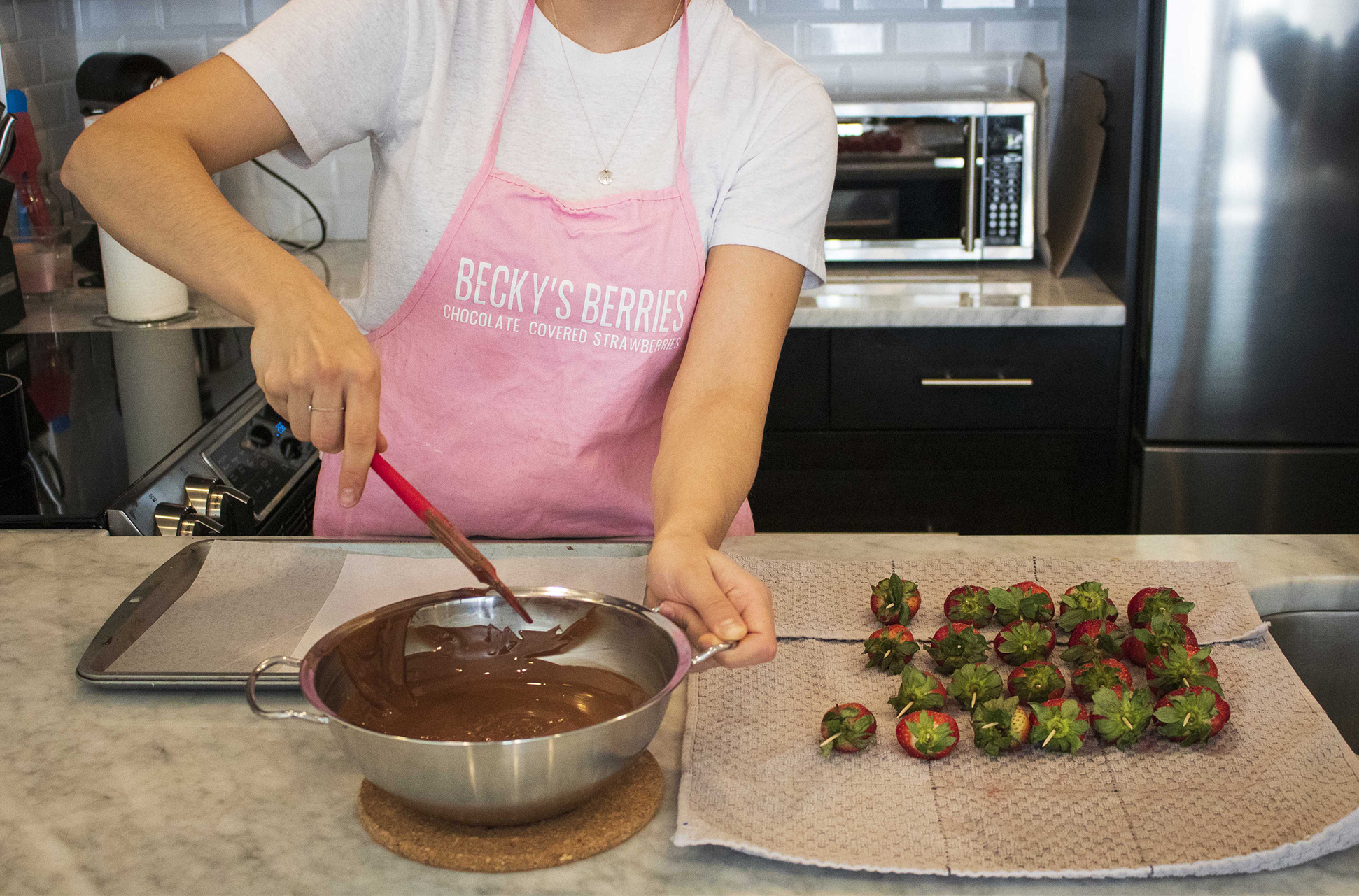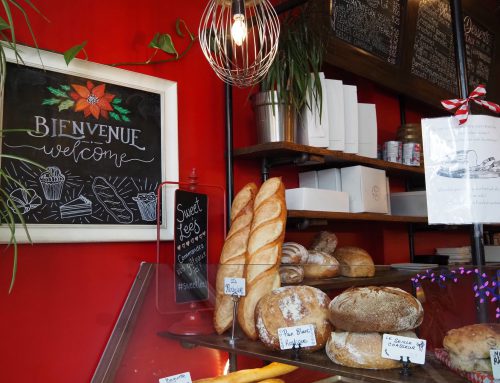BY Jonathan Ciaccia & Skye Legault
Although it’s been a difficult year, the pandemic couldn’t have come at a better time for new home-based business owners. As restaurants and bakeries were forced to either put their business on hold or close down entirely, the extra time spent at home has served as a stepping stone for young entrepreneurs.
“Business hasn’t slowed down, it’s only gotten busier,” says Rebecca Caporicci, the owner of Becky’s Berries, a home-based chocolate covered strawberry business. “At-home businesses have been thriving because people want to support local.”
The 23-year-old started her business from the comfort of her Lachine condo in February 2020. Originally, Caporicci started making chocolate covered strawberries for her friends and family as a treat. Her love for both food and sweets, along with the support of her loved ones, would eventually inspire the idea of turning a hobby into a business.

Caporicci checks her agenda every morning to stay organized and see how many orders she needs to prepare for the day. Photo by Jonathan Ciaccia.
What may seem at first as an easy opportunity to make some extra money isn’t all fun and games. Building up a business requires many hours of work and commitment if it’s going to succeed in the long run.
“There’s so much that happens behind the scenes that nobody knows about,” says Caporicci. “It’s more than just the berries.”
For the young businesswoman, a typical week on the job consists of hours devoted to scheduling, budgeting, grocery shopping, prepping, marketing, cleaning, and occasionally testing new flavours.
“I can’t remember my last full day off because there’s always something to do,” says Caporicci.

Caporicci melts and stirs her chocolate over a hot stove in preparation for her orders of the day in the kitchen of her condo in Lachine, Quebec on Tuesday, March 23, 2021. Photo by Jonathan Ciaccia.
In order to fulfill her daily orders, Caporicci goes through more than 50 packs of fresh strawberries each week, which she purchases from local grocery stores. Her chocolates and toppings are purchased from a nearby supplier, while other supplies such as boxes, stickers, cooking molds and accessories are bought online.
Robert Soroka, a business professor at Concordia University, believes that home-based businesses are becoming popular because people can gain hands-on experience with a low-risk business approach.
“It allows aspiring entrepreneurs to eliminate a lot of the costs that can essentially anchor down the growth of a new business,” says Soroka. “But if you’re going to treat this like a part-time endeavor, you’re not really creating a business, what you’re doing is creating a hobby.”
Operating from home immediately reduces your operating expenses since you can use your own supplies and appliances. Soroka adds that you also don’t have the pressure of needing to scale-up right away, allowing you to grow your business gradually and enjoy the experience of doing something fun and creative.

Caporicci prepares a batch of her chocolate covered strawberries in the kitchen of her condo in Lachine, Quebec on Tuesday, March 23, 2021. Photo by Jonathan Ciaccia.
When it comes to running a storefront bakery on the other hand, there’s a list of operating costs.
“My biggest expense is having to pay rent,” says Lina Caruso, the owner of Créme Fraîche, a small bistro and bakery shop located in Valois Village in Pointe-Claire. Other expenses include maintenance, insurance, property taxes, appliances and utilities, and paying employees.
The extra space, however, does allow businesses to produce more. Another advantage is the opportunity to physically interact with clients, something that’s difficult to mimic with a home business.
“A lot of people like to physically see their product,” says Caruso.
She also enjoys the separation between work and her home life.
“I can’t stay home and bake in my kitchen all day,” says Caruso. “I need to get out.”
Taking work home with you is an unfortunate reality when running a baking business from your parents’ basement explains Athina Lappos, the owner of Decadent Dough, a cookie business that she started back in 2016.
Similar to Caporicci, Lappos started baking cookies for her friends and family when she was eventually approached with the idea to start selling them.
“I like being my own boss,” she says.
Social media has revolutionized marketing for home-based businesses. It has created an inexpensive way to reach a mass market and gives entrepreneurs with limited funds an opportunity to compete on a larger scale.
Learn more about online dessert businesses that cater to vegan and a gluten-free clientele. Video by Skye Legault.
“The most effective people on social media are the ones constantly coming up with content,” says Soroka. “You want to have the people you’ve attracted to keep coming back.”
Instagram has been Caporicci’s main outlet to promote her product and for clients to place orders for pickup.
“It’s very important to have an aesthetic picture and that’s what Instagram is all about,” she says. “The more you post, the more interaction you’re going to get on your page.”
Posting also needs to be done in a strategic and timely manner. Over-advertising a product can lead to an overbooking of orders, which can become an issue based when dealing with limited supplies. Upsetting hungry clients is not an ideal business strategy when working in the food industry.

A fresh box of Caporicci’s chocolate covered strawberries topped with pieces of Skor chocolate, Cadbury Mini Eggs, and Oreo cookies. Photo by Jonathan Ciaccia.
While Caruso was forced to close her shop for three months during the pandemic, home-based businesses were able to operate all the way through. Caruso feels that her business has always had a slight disadvantage due to a lack of government control over home-based food businesses.
“They aren’t regulated,” she explains. “I’m paying the taxes and they’re pocketing everything.”
In Quebec, businesses must register with the government to obtain an official business license, which ensures provincial monitoring. All commercial activities that exceed income over $30,000 must register with Revenue Quebec in order to declare income tax.
There is no specific rule that says it’s mandatory for home-based businesses to register under the Quebec government if they’re making less than the minimum amount. However, all home businesses are expected to meet health standards.
“It is the responsibility of food manufacturers, producers and retailers to understand the risks associated with the food they produce and sell, regardless of the method of sale,” according to the Canadian Food Inspection Agency.
Caporicci and Lappos had only recently registered their business, which ensures legal protection of their company name under Quebec laws.
“Once a company starts to sell their product to customers in other provinces or countries, they would need a Safe Food for Canadians license,” the CFIA says.
They have regular health and safety inspections for restaurants, but for home-based businesses, they’re not going to come knocking on your door
While Caruso’s shop receives a mandatory inspection every year, it’s much harder to monitor the overall cleanliness of a home-based work station especially during the early stages of operation.
Caporicci is currently completing her Food Handler Certification through an online course that is recognized by both the federal and provincial government. It offers basic training in food safety and is said to be presented upon a notice of inspection, according to the Canadian Institute of Food Safety.
“They have regular health and safety inspections for restaurants, but for home-based businesses, they’re not going to come knocking on your door,” says Lappos.
Both business models offer different perks for owners and their clients. Although home-based businesses tend to cater to younger online consumers, ‘older’ shoppers may prefer a more traditional experience that allows them to walk into a bakery.
“Consumers aren’t really good at changing their shopping patterns,” says Soroka.
Running a small business also comes with the advantage of having additional support from certain national agencies, especially during the pandemic.
“We have advocated to the federal government to increase the support it provides small businesses, to keep certain programs in place for as long as necessary, and to expand eligibility so that all businesses in need of assistance can apply for them,” says the Canadian Federation of Independent Business.
Small and medium-sized businesses are generally defined as having fewer than 500 employees. Home-based businesses and those run by sole proprietors are included in the sector of businesses that the CFIB serves.
Their counsellors are there to assist small businesses in finding the right government support programs they qualify for, such as the Canada Emergency Wage Subsidy, the Canada Emergency Business Account, and the Canada Emergency Rent Subsidy.
While each respected business style may pose a small competitive threat for one another, there still remains a functional market for both that require passion and hard work to be successful.
“What I love about this industry is that I’m never limited when it comes to being creative,” says Caporicci.
Test your knowledge and see if you know what it takes to start a home-based business. Media by Jonathan Ciaccia.




